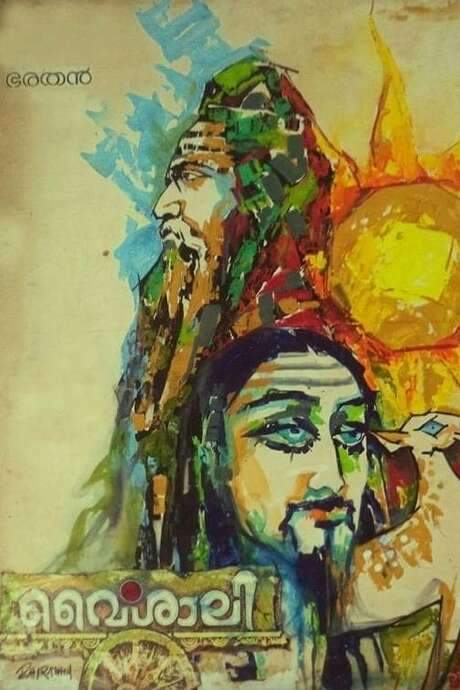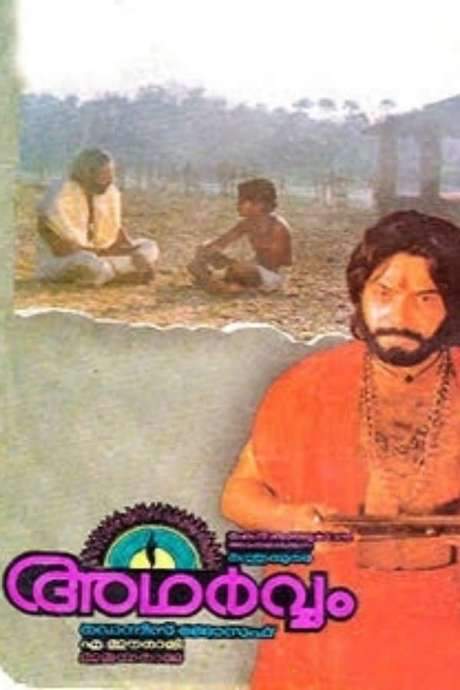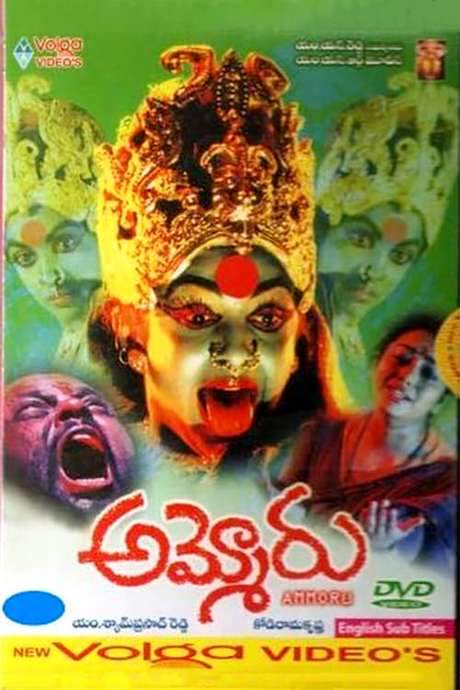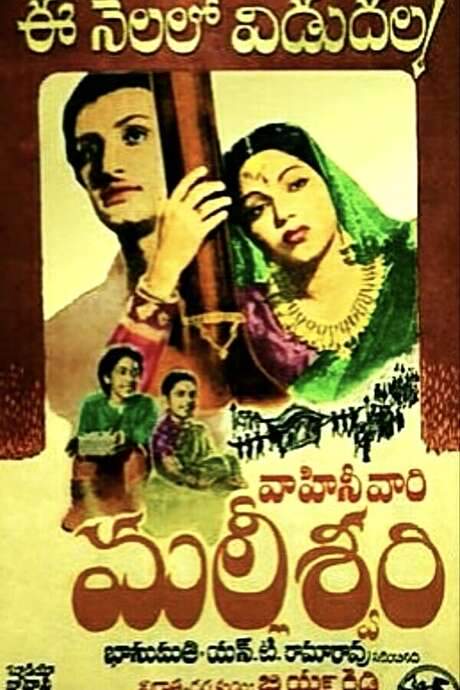
Saraswathi Sabatham
Year: 1966
Runtime: 148 mins
Language: Tamil
Director: A. P. Nagarajan
Sage Narada provokes a rivalry among the goddesses Saraswati, Lakshmi and Parvati, each championing a different ideal—knowledge, wealth and strength. The three divine sisters embark on a contest to demonstrate which virtue holds the greatest importance in a man's life, seeking to prove that their respective domain is the most essential.
Warning: spoilers below!
Haven’t seen Saraswathi Sabatham yet? This summary contains major spoilers. Bookmark the page, watch the movie, and come back for the full breakdown. If you're ready, scroll on and relive the story!
Saraswathi Sabatham (1966) – Full Plot Summary & Ending Explained
Read the complete plot breakdown of Saraswathi Sabatham (1966), including all key story events, major twists, and the ending explained in detail. Discover what really happened—and what it all means.
In a celestial chorus, a trio of goddesses debates which power governs the world most: Saraswati embodies knowledge, Lakshmi wields wealth, and Parvati stands for strength. The meddling sage Narada stirs the pot by visiting each goddess in turn, taunting them into a test of supremacy. His provocations set off a chain of challenges: Saraswati declares that knowledge must prove its worth, Lakshmi insists wealth is supreme, and Parvati contends that only raw power can win the day. As each goddess presses her case, the others grow wary, and a fragile rift forms among them.
To test their powers on earth, the goddesses bless three ordinary people with their respective gifts. Saraswati grants Vidyapati Vidyapati the world’s knowledge and the gift of speech, transforming a once mute man into a masterful wordsmith. On the other side of the mortal ledger, Lakshmi endows Selvambigai with wealth, turning a beggar girl into a figure of fortune in Selvapuram. Parvati bestows Veeramallan with extraordinary strength, choosing a man who has long struggled with fear and cowardice, yet who now bears the burden of power.
The moment Vidyapati and Selvambigai meet in a temple, their clash becomes immediate. His newly acquired knowledge makes him confident, even arrogant, while her wealth makes her feel entitled to admiration and deference. The tension between them crackles, and Selvambigai finds herself irritated by his relentless intellect, while Vidyapati grows exasperated by her ostentation. Veeramallan, who has proven his bravery by saving Selvambigai from a life-threatening accident, notices the strain between the two and becomes suspicious of Selvambigai’s ability to govern. He rises to the occasion in a dramatic turn of events, and is soon elevated to the position of commander-in-chief of the kingdom’s army, reflecting his strength and situational courage.
Vidyapati’s brilliance does not go unnoticed either; Selvambigai recognizes that his knowledge could be a powerful tool for the realm, and she appoints him as the head poet, hoping his words would elevate Selvapuram’s fame and prestige. This alliance of wits and wealth, however, draws Veeramallan’s ire. He perceives Selvambigai as neglecting her royal duties in the constant banquet of psychological sparring with Vidyapati. Fueled by fear of losing control, he stirs his soldiers to rebel and soon imprisons Vidyapati. Selvambigai, determined to preserve her own authority, slips into the prison to seek Vidyapati’s praise in exchange for his freedom. But Vidyapati refuses to be traded for praise; instead, he sings in a way that disrespects her, a rebuke that inflames the king’s ally.
The conflict escalates quickly. Veeramallan, now convinced that Selvambigai’s rule is a mistake, orders not only Vidyapati’s imprisonment but also the execution of both himself and the queen, overturning Selvapuram’s order and seizing the throne for good. In this moment of crisis, the gods—Shiva, Vishnu, and Brahma—step in to reveal a timeless truth: when knowledge, wealth, and strength stand separately, they become dangerous; only their united force can sustain a realm. The Holy Trinity explains how dangerous it is for any one power to dominate, underscoring that harmony among the three is essential for true prosperity.
With the divine guidance finally heard, the goddesses reconcile their positions. Vidyapati, Selvambigai, and Veeramallan—each having learned from their encounters—recognize the value of balance. Knowledge without wealth or strength can be cold and hollow; wealth without wisdom or courage can corrupt; and strength without discernment can crush the vulnerable. In a moment of restored equilibrium, the trio embraces the idea that wealth, knowledge, and strength together form a complete, responsible power.
The tale closes on a note of reformation rather than triumph, a meditation on how mythic blessings must be tempered by virtue and mutual respect. The once-divided trio finds common ground, and the mortals who bore these divine gifts—Vidyapati, Selvambigai, and Veeramallan—learn to wield their powers with humility and cooperation. The narrative, rich with drama and moral reflection, leaves us with a timeless reminder: true greatness arises not from possessing a single gift, but from honoring and integrating all three—knowledge, wealth, and strength—for the good of all.
The ending underlines a hopeful reconciliation: the goddesses, the humans who received their blessings, and the divine triad itself acknowledge that strength, wisdom, and prosperity must walk hand in hand. The once-divided forces now cooperate, suggesting that harmony among differing powers is the key to lasting peace and progress. This mythic meditation on balance and responsibility remains a vivid reflection on power’s responsibilities, inviting audiences to consider how they wield their own gifts in the world.
Last Updated: October 09, 2025 at 09:23
Explore Movie Threads
Discover curated groups of movies connected by mood, themes, and story style. Browse collections built around emotion, atmosphere, and narrative focus to easily find films that match what you feel like watching right now.
Movies with divine moral trials like Saraswathi Sabatham
Stories where deities challenge mortals to prove the value of abstract virtues.Explore movies like Saraswathi Sabatham where celestial beings orchestrate contests to test human virtues. These similar fantasy stories use mythical frameworks to explore philosophical questions and moral balance, often ending with a hopeful lesson about cooperation and harmony.
Narrative Summary
The narrative typically begins with a provocation in the divine realm, leading to a contest where selected mortals become champions for different ideals. The story follows their trials, which escalate in drama and consequence, culminating in a crisis that forces a revelation about the interdependence of these virtues, resulting in a harmonious resolution.
Why These Movies?
These films are grouped together because they share a core structure of divine intervention, moral testing, and a focus on philosophical debate over physical conflict. They create a specific vibe that is both dramatic and contemplative, blending mythical world-building with accessible human struggles.
Harmonious mythic fables like Saraswathi Sabatham
Mythological stories where initial conflict gives way to unity and cooperation.If you liked the hopeful resolution and moral harmony of Saraswathi Sabatham, you'll enjoy these similar movies. They are mythical or fantasy tales that begin with rivalry but ultimately celebrate cooperation and balance, leaving the viewer with a positive and contemplative feeling.
Narrative Summary
These narratives often start with a schism or competition that creates dramatic tension. The plot then follows the consequences of this divide, building towards a pivotal moment of crisis that clarifies the need for unity. The resolution is not about one side winning, but about integrating opposing forces to create a stronger, more harmonious whole.
Why These Movies?
They are linked by a shared emotional arc that moves from dramatic conflict to a hopeful, harmonious ending. The experience is defined by a steady pace, medium emotional weight, and a focus on revealing a positive moral about collaboration, making them uplifting without being simplistic.
Unlock the Full Story of Saraswathi Sabatham
Don't stop at just watching — explore Saraswathi Sabatham in full detail. From the complete plot summary and scene-by-scene timeline to character breakdowns, thematic analysis, and a deep dive into the ending — every page helps you truly understand what Saraswathi Sabatham is all about. Plus, discover what's next after the movie.
Saraswathi Sabatham Timeline
Track the full timeline of Saraswathi Sabatham with every major event arranged chronologically. Perfect for decoding non-linear storytelling, flashbacks, or parallel narratives with a clear scene-by-scene breakdown.

Characters, Settings & Themes in Saraswathi Sabatham
Discover the characters, locations, and core themes that shape Saraswathi Sabatham. Get insights into symbolic elements, setting significance, and deeper narrative meaning — ideal for thematic analysis and movie breakdowns.

Saraswathi Sabatham Spoiler-Free Summary
Get a quick, spoiler-free overview of Saraswathi Sabatham that covers the main plot points and key details without revealing any major twists or spoilers. Perfect for those who want to know what to expect before diving in.

More About Saraswathi Sabatham
Visit What's After the Movie to explore more about Saraswathi Sabatham: box office results, cast and crew info, production details, post-credit scenes, and external links — all in one place for movie fans and researchers.

Similar Movies to Saraswathi Sabatham
Discover movies like Saraswathi Sabatham that share similar genres, themes, and storytelling elements. Whether you’re drawn to the atmosphere, character arcs, or plot structure, these curated recommendations will help you explore more films you’ll love.
Explore More About Movie Saraswathi Sabatham
Saraswathi Sabatham (1966) Scene-by-Scene Movie Timeline
Saraswathi Sabatham (1966) Movie Characters, Themes & Settings
Saraswathi Sabatham (1966) Spoiler-Free Summary & Key Flow
Movies Like Saraswathi Sabatham – Similar Titles You’ll Enjoy
Sri Manjunatha (2001) Full Summary & Key Details
Natasaarvabhowma (2019) Detailed Story Recap
Navarasa (2005) Film Overview & Timeline
Sasneham (1990) Spoiler-Packed Plot Recap
Gangaa Jamunaa Saraswathi (1988) Ending Explained & Film Insights
Vaishali (1988) Complete Plot Breakdown
Adharvam (1989) Film Overview & Timeline
Saravana (2006) Film Overview & Timeline
Vasanthi (2021) Full Summary & Key Details
Sarpatta Parambarai (2021) Story Summary & Characters
Paramanandayya Sishyula Katha (1966) Story Summary & Characters
Ammoru (1995) Spoiler-Packed Plot Recap
Malliswari (1951) Plot Summary & Ending Explained
Saradha Bullodu (1996) Complete Plot Breakdown
Pathala Bhairavi (1951) Movie Recap & Themes










































